|
|
|
Sort Order |
|
|
|
Items / Page
|
|
|
|
|
|
|
| Srl | Item |
| 1 |
ID:
098883
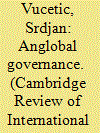

|
|
|
|
|
| Publication |
2010.
|
| Summary/Abstract |
The 'Anglosphere' refers to a grouping of English-speaking states, nations and societies united by the language, values and institutions associated with the historical experience of England/Britain. After being introduced in 1999-2000 at two conferences convened by the Hudson Institute, the idea of the Anglosphere has become increasingly popular with various Anglophiles and especially with Anglo-American conservatives and neoconservatives. After a brief inquiry into the broader conceptual and historical foundations of this neologism, this article considers some ways in which the Anglosphere relates to the research programme on global governance in the field of international relations (IR). Using 'liberal imperialism' as a theoretical starting point, the article evaluates the Anglosphere as a tool for promoting greater attention to the role of race and racism in the emergence of the structure and processes of contemporary global governance. For all its political, logical and other ambiguities, when approached as an arena of critical analysis, an Anglosphere perspective can indeed help us comprehend the development and general patterns of the racialized world order. For that reason alone, Anglobal governance should be worthy of study in IR.
|
|
|
|
|
|
|
|
|
|
|
|
|
|
|
|
| 2 |
ID:
099444
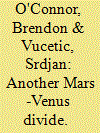

|
|
|
|
|
| Publication |
2010.
|
| Summary/Abstract |
Why did Australia fight in Iraq, while Canada did not? In this paired comparison, we go beyond explanations centered on the role of leaders to consider three alternative factors-ruling party opinion, public opinion and strategic culture. We argue that in both countries the Iraq decision followed the dominant views within the ruling party as well as the dominant strategic culture among the elites. As for the public opinion, its impact was significant in Canada, especially concerning the province of Quebec, while in Australia its impact was mostly neutral. This type of explanation, we suggest, is not only more historically grounded, but it can also illuminate broader patterns of Australian and Canadian foreign policy behaviour.
|
|
|
|
|
|
|
|
|
|
|
|
|
|
|
|
| 3 |
ID:
120445
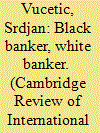

|
|
|
|
|
| Publication |
2013.
|
| Summary/Abstract |
Critical study of the 'global colour line' usually begins by observing similarities between the colonial-colonized relationship on the one hand, and the developed-developing relationship on the other. Despite the dramatic historical changes in human equality over time, both relationships are sometimes qualified with reference to race and racism. This article reflects on these continuities and changes via two debates in the philosophy of race: the 'onto-semantic' and the 'normative'. Each of these debates, I argue, can help international relations (IR) better understand the complex social meanings and political transformations of the global colour line. After I have made a case for the use of categories of racialization and racialized identity over the category 'race', I suggest that IR theorists, too, should pay more critical attention to the burgeoning literatures on racial habits and racial cognition.
|
|
|
|
|
|
|
|
|
|
|
|
|
|
|
|
| 4 |
ID:
103664


|
|
|
|
|
| Publication |
2011.
|
| Summary/Abstract |
This article addresses the question whether membership in the 'Anglosphere' - a grouping of English-speaking states/nations - impacts the likelihood of participation in US-led coalitions of the willing. I translate the Anglosphere into International Relations (IR) theory using a tripartite division of realism, liberalism and constructivism. In a quantitative empirical analysis of a sample of US-led military coalitions between 1950 and 2001, I find robust evidence of what can be seen as the Anglosphere effect: all else constant, English-speaking states/nations tend to be more willing to join US-led military coalitions than states/nations selected at random. I conclude with a discussion of future research avenues in the Anglosphere agenda in IR.
|
|
|
|
|
|
|
|
|
|
|
|
|
|
|
|
| 5 |
ID:
183873
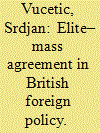

|
|
|
|
|
| Summary/Abstract |
Thirty years ago, William Wallace likened British foreign policy to a musical tug-of-war between the ‘Anglo-Saxons’ and ‘Europeans’, attributing ‘all the best tunes’ to the former. This article revisits Wallace's thesis and its main concept: national identity. It finds that Wallace was right to draw attention to the power of the ruling elite to shape Englishness and Britishness. However, the article also finds that ‘global’ foreign policy ideas were never the exclusive province of a segment of the British elite. Rather, they circulated in English and more broadly British society writ large, reflecting and reinforcing deep-seated, even unselfconscious, agreements between both ‘Anglo-Saxon’ and ‘European’ elites on the one hand, and much of the mass consumer public on the other. It follows that the constraints posed on possibilities of foreign policy change were always greater than Wallace had suggested; that a ‘lesser’ British foreign policy that was, and still is, so hard to imagine for the British is significant for analysis of dynamics of ‘western’ knowledge production that come under critique in this special issue. But rather than focusing exclusively on elites, critical analyses of knowledge exchange should be attuned to popular common sense, too.
|
|
|
|
|
|
|
|
|
|
|
|
|
|
|
|
| 6 |
ID:
123317
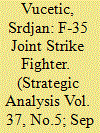

|
|
|
|
|
| Publication |
2013.
|
| Summary/Abstract |
The United States dominates global defence markets, but the nature of this dominance is shifting. Strategic and budgetary considerations-the latter being constantly restructured by the rising relative cost of defence labour-drive US defence production towards international collaboration. In this essay, I examine the politics of a high-calibre international collaborative programme that has made headlines in recent years: the F-35 Joint Strike Fighter (JSF). What motivated the US government to take on partners, and what influence, if any, have the partners had on the programme so far? Also, how have the partner governments dealt with the mounting controversies surrounding this programme?
With respect to the first two questions, my goal in this essay will be to provide an overview of the programme, including the most up-to-date progress report. As for the third question, what interests me-and I recognise the question brings into play a much broader political analysis-is the manner in which partner governments have publicly justified participation in a US-controlled weapons programme that is handicapped by rising costs, delays and performance shortfalls. All major arms acquisitions involve public exchanges over complex trade-offs among capability, costs, job-creation and strategy, which, I suggest, can contribute to the understanding of the politics of arms production and arms transfers. Judging by the positions taken by supporters and opponents across national debates on F-35 acquisition in the 2009-2012 time period, the partner countries appear to be resigned to their fate as rule-takers in the programme. A seemingly impending cut in production quantities will affect them all, but the combination of sunk costs and alliance politics is likely to compel the partners to stay the course, even if it means reducing 'original' individual orders by 50 per cent or more.
|
|
|
|
|
|
|
|
|
|
|
|
|
|
|
|
| 7 |
ID:
105650
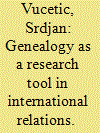

|
|
|
| 8 |
ID:
154640
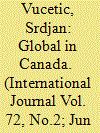

|
|
|
|
|
| Summary/Abstract |
Whatever their inherent shortcomings, self-narratives are a usable method for producing sociologies of knowledge. Focusing on my undergraduate and graduate student days, I look back at my socialization into the field of Canadian Foreign Policy. I then proceed to offer some thoughts about the future of the field.
|
|
|
|
|
|
|
|
|
|
|
|
|
|
|
|
| 9 |
ID:
121239
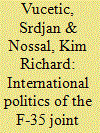

|
|
|
|
|
| Publication |
2013.
|
| Summary/Abstract |
There is a good reason why the F-35 Joint Strike Fighter program is so often
described as the "arms deal of the century." In a report published on the last
day of 2010, the Pentagon estimated lifetime operating and sustainment
costs for the US F-35 fleet-then projected at 2,443 units, not counting
the prototypes-at US$1.45 trillion.1
Cost analyses of this type are always
much-debated: How many units will be sold in total? How does one define "lifetime"? How reliable will the system be once it enters service? What
will be the nature of its deployment? And so on. Beyond dispute is that the
F-35 constitutes one of the largest, if not the largest, weapons programs in
modern history.
|
|
|
|
|
|
|
|
|
|
|
|
|
|
|
|
| 10 |
ID:
157680
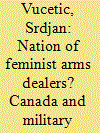

|
|
|
|
|
| Summary/Abstract |
The Canada-Saudi light armoured vehicles deal is likely to be remembered as the Trudeau government’s first scandal. Situating this deal in a historical-comparative context and using the best available quantitative arms trade data, this analysis advances two main claims. First, Canada’s Liberal governments are just as likely as Conservative governments to encourage exports of Canadian military goods, including goods going to human rights-abusing customers. Second, Canada’s overall arms exporting behaviour is similar to the behaviour of its “international do-gooder” peers, Sweden and the Netherlands. How Canadian governments will respond to the ever-increasing international demands for accountability in this area remains to be seen.
|
|
|
|
|
|
|
|
|
|
|
|
|
|
|
|
| 11 |
ID:
121246
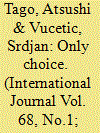

|
|
|
|
|
| Publication |
2013.
|
| Summary/Abstract |
The United States has two faithful allies in Canada and Japan. Established at
different points in the twentieth century, the two alliances have grown and
flourished, helping to maintain an American-led order in the Asia-Pacific
and beyond. By any reasonable measure, few states are as integrated in
the American security sphere as these two. In David A. Lake's index of US
"security hierarchy," which measures a variety of bargaining mechanisms
through which states voluntarily trade autonomy and sovereignty for order,
prosperity, and cheaper security provided by the US, Japan ranks fifth and Canada eighth.1
From this perspective, it is not surprising that Japan and
Canada are participating in the F-35 Joint Strike Fighter (JSF) program.
|
|
|
|
|
|
|
|
|
|
|
|
|
|
|
|
| 12 |
ID:
108186
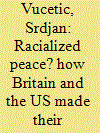

|
|
|
|
|
| Publication |
2011.
|
| Summary/Abstract |
The extensive literature on the Anglo-American "special relationship" revolves around an observation that Britain and the US tend to cooperate more closely than any other comparable pair of states. I argue that this cooperation pattern originates in the construction of a "racialized peace" between the American and British empires at the fin-de-siècle. My argument builds on constructivist theorizations of the links among state/national identity, foreign policy, and international conflict/cooperation. Beginning with a discourse analysis of representative texts from the period leading up to the Venezuela crisis of 1895-96, I show how American and British elites succeeded in framing themselves as the vanguards of civilization and how the idea that two Anglo-Saxon entities could not fight each other in a global political system defined by race had significant consequences in world politics.
|
|
|
|
|
|
|
|
|
|
|
|
|
|
|
|
| 13 |
ID:
136875
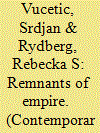

|
|
|
|
|
| Summary/Abstract |
What is left of the ‘empire by invitation’? Coined by Geir Lundestad in 1986, the seemingly contradictory phrase has been used to explain the nature of American power in Western Europe and beyond. This article revisits the concept to shed light on Norway's 2008 decision to recapitalize its fighter jet fleet with the F-35 Joint Strike Fighter – an event of considerable political significance in the ongoing history of this complex, controversial, and geopolitically consequential weapons programme. Using multiple sources, including diplomatic cables released by WikiLeaks, the article traces how Americans and their local brokers intervened in the Norwegian policy process to ensure that the F-35s would go to the Royal Norwegian Air Force. In addition to suggesting that ‘empire by invitation’ remains a fact of international political life, the analysis also shows the importance of legitimation strategies in security policy. This especially applies to the study of international arms deals because interactions between and among politicians, diplomats, bureaucrats, and lobbyists always involve claims and counterclaims about legitimate national interest.
|
|
|
|
|
|
|
|
|
|
|
|
|
|
|
|
| 14 |
ID:
105359
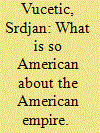

|
|
|
|
|
| Publication |
2011.
|
| Summary/Abstract |
This article argues that the American empire cannot be fully understood without reference to the ways in which American imperial identities have been associated with the historical experience of England/Britain. To make this argument, the article considers four discourses of identity in particular - Anglo-Protestantism (religion), Anglo-Saxonism (ethnicity/race), Anglo-Saxon capitalism (institutions) and English (language). US imperial development was conditioned by many forces, but none match the aggregate power of America's 'Anglo-ness'. Although it is too early to assess the ways in which these discourses are negotiated, critiqued and reproduced in the 'age of Obama', the American empire is likely to continue to protect and project Anglo-ness vis-à-vis to the rest of the world.
|
|
|
|
|
|
|
|
|
|
|
|
|
|
|
|
| 15 |
ID:
146489


|
|
|
|
|
| Summary/Abstract |
How did the Canadian news media cover the F-35 Joint Strike Fighter purchase, proposed by the Harper government in mid-2010? Under what conditions did the media tend to index government talking points as opposed to providing space to oppositional voices and viewpoints? Content analysis of headlines and full text transcripts in five mainstream newspapers revealed news coverage that was mostly negative and that it became more negative as consensus within official decision circles dissipated. Overall, the findings fit most closely with the predictions of the cascading activation model of government–media relations, while also underscoring the importance of factors specific to the Canadian context.
|
|
|
|
|
|
|
|
|
|
|
|
|
|
|
|
|
|
|
|
|